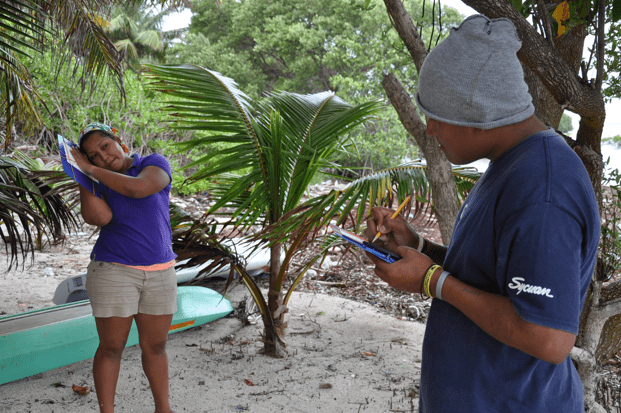With extremely rapid reproduction and few natural predators outside its native range, lionfish populations have exploded across the Caribbean, devastating fish and invertebrate communities on coral reefs throughout the region. Lionfish are a particular menace for Belize, a small country where fishing and marine tourism support the livelihoods of over 15,000 people and contribute 25% to GDP. Whilst eradicating lionfish is not possible, recent research has shown that suppressing populations on coral reefs allows native marine species to recover. To do so requires significant and consistent removal of lionfish at scale, with the engagement of all reef stakeholders.
As outlined in the Mesoamerican Reef Lionfish Strategy, lionfish control must be addressed differently in areas accessible to fishers, No Take Zones and the deep sea. Although the latter is a bit out of our depth (pun intended), we are currently partnering with the Belize Fisheries Department to develop the national strategy for lionfish control in areas accessible to fishers and within No Take Zones.

Eli Muñoz, a fisher from Sarteneja, removing spines from lionfish caught in Placencia. Our goal is to develop a strategy that provides the framework for development of a ‘lionfishery’, conferring social, environmental and economic benefits.
Step one for developing the strategy was to form a survey team that can collect data on lionfish and their prey fish populations at reefs across Belize. As lionfish are extremely well camouflaged and love to hide under overhangs, the methods we use to count other reef fish underestimate lionfish density. Instead, a method known as a Lionfish Focussed Search is required. Furthermore, as lionfish are gape-limited predators with generalist diets, “prey fish” includes all species of coral reef fish that can fit in a lionfish’s mouth! A new method and a much bigger species list than we are used to dealing with meant that special training was required.
To achieve this, earlier this year eleven biologists and community researchers, coming from Belize Fisheries Department, Toledo Institute for Development and Environment (TIDE), Belize Audubon Society (BAS) and Blue Ventures, made their way to San Pedro. There, they met with Blue Ventures’ staff and expert lionfish researchers, Dr Stephanie Green and Lad Akins. Once all together, the group made its way out to Bacalar Chico Dive Camp (BCDC).

Lad Akins, Director of Special Projects at REEF, and Dr Stephanie Green, author of the lionfish monitoring chapter in the GCFI Lionfish Guide, led the lionfish survey training at BCDC.
Key learning objectives for the training were for participants to attain level 3 REEF fish identification, learn to estimate fish size to 1cm accuracy, and practice conducting practice prey fish and lionfish focused search surveys.

Practicing size estimation on the beach at BCDC: Fisheries biologists Elias, Henry and Ali, and BAS marine biologist Eli

Practicing size estimation on the beach at BCDC: TIDE’s marine biologist, Tanya, and four community researchers, Gen, Fernando, Bevin and Willie.

Tanya and Fernando (TIDE) practice the lionfish focussed search (and communicating lionfish behaviour!) on land.
With many new fish families and species to learn, a large part of the training focussed on identification. To measure progress, all participants took fish identification tests before and after the training. Overall, everyone’s scores improved and everyone said that they found learning these new fish that we typically overlook on dives extremely interesting. Elias Cantun, from the Belize Fisheries Department, who definitely showed the most interest in all the tiny gobies and blennies, was rewarded with being the most improved at fish identification!

Heading out for a practice survey dive (L-R: Lad, Henry, Ali, Marc and Bev, with BV Captain Desi to the back)

Post dive debrief at BCDC
Although bad luck with diving conditions meant that not all planned dives could be completed, nearly everyone got to practice everything in the water. Overall, it was an extremely successful workshop and we now have a team of lionfish surveyors ready to start collecting data all over Belize!
Thank you to the MAR Fund for funding this activity, and to REEF for providing additional survey equipment. Thank you also to Steph and Lad for their incredible help and support, both with planning and carrying out the training.

